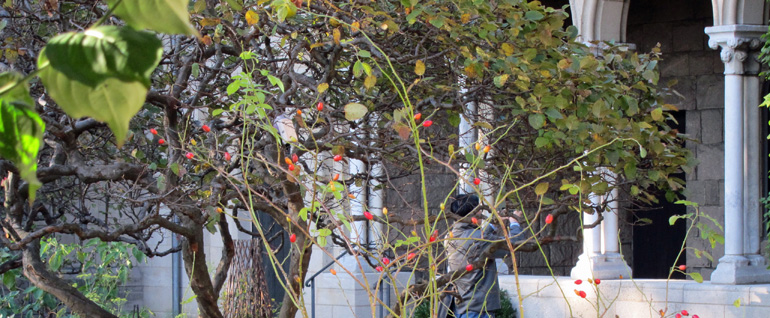
Matins ¶ Scott Horton talks to C Bradley Thompson about the new book that he has co-authored, Neoconservatism: An Obituary for an Idea, and — wow! “War–perpetual war–is the ultimate means by which the neocons can fight creeping nihilism and promote sacrifice and nationalistic patriotism.” Shout it from the housetops! Given the lack of sacrifice evident during the neocon-accented Bush Administrations, we can only suppose that there just wasn’t enough war. “In the end,” Thompson remarks, “this is what neoconservatism is all about and it’s why we’ve written its obituary in the hopes of killing it. (Harper‘s)
Lauds ¶ What we want to know is, how do you stuff 175 Picassos into a suitcase? (Even a suitcase as big as the Editor’s, which always gets a HEAVY tag from baggage handlers.) There are lots of other mysteries surrounding the trove that an electrician and his wife, Pierre and Danielle Le Guennec, showed to Claude Picasso in September, and you’ll get an idea of just how murky this mess is from Kim Willsher’s breathless account in the Guardian or from Kate Deimling’s less atmospheric account at ArtInfo. From the latter, which is based on a radio interview, we learn that M Le Guennec stored the Picassos in the garage and never looked at them, because “I wasn’t at all aware of their value.” Douteux!
Prime ¶ We were thrilled to read that Don Blankenship was retiring from Massey Energy, even though we didn’t know the story by Jeff Goodell in Rolling Stone that may well have prompted the unexpected move. Mr Blankenship’s wickedness was branded on our minds in the wake of last April’s Upper Big Branch mine explosion, which killed 29 men. Goodell calls him “the embodiment of everything that’s wrong with the business and politics of energy in America today,” and we think that that’s putting it mildly. Like Felix Salmon, we hope that the story doesn’t end the way the coal baron wants it to:
“I don’t care what people think,†he once said during a talk to a gathering of Republican Party leaders in West Virginia. “At the end of the day, Don Blankenship is going to die with more money than he needs.â€
Next up? Rolling Stone ought to get Chris Lehmann to expand his investigation of Stewart and Lynda Resnick.
Tierce ¶ We are not thrilled to learn that Jonah Lehrer has retreated behind the paywall at The New Yorker. His article on the replication woes of modern science, “The Truth Wears Off,” is hugely important, not least because it will probably be openly misinterpreted by creationists and other Doubting Thomases as “proof” that research scientists fudge their findings. The problem that Lehrer labels “the slipperiness of empiricism” must now be examined from every angle. Our own suspicion is that we’ve reached a frontier of research that can be crossed only with new tools — language tools especially. Over two hundred years ago, Lavoisier made a science out of alchemy by codifying chemistry’s nouns and adjectives. It may be time to tackle the verbs.
Regarding the paywall, though: if you can afford only one magazine subscription, you ought to make it The New Yorker.
Sext ¶ It has been a while (we think) since Dave Bry entertained us with one of his Public Apologies, and from the latest in the series, we can sort of guess why: he has, astonishingly, run out of things to feel sorry for. In the current offering, he apologizes to his black date for squeezing her hand a bit tightly at a Gravediggaz event (we really cannot bring ourselves to call such things “concerts”). Dave was one of only two white attendees, and when the band rolled out a guillotine… “’Fear’ is a strong word. I never felt directly threatened.” But. (The Awl)
Nones ¶ At Foreign Policy, Charles Kenny re-examines “the resource curse,” which holds that nations with abundant natural resources are prone to poverty and civil war. We’re not sure that we ever subscribed to this idea, which is not quite the same as holding that extractive economies are prone to poverty and civil war. Even Mr Kenny admits that “ countries don’t get rich if all they do is produce crops and dig stuff out of the ground.” (via Real Clear World)
Vespers ¶ Kyle Minor makes explicit a distinction that we have often sensed but never thought through. We must confess that the word “experimental,” when used in connection with the creative imagination, conjures up “the experiment that rises from something like a creative chaos, and which finds whatever form it finds out of a chaotic process and in a state that is often enough mimetic of that chaos.” What Kyle has come to prefer is the fiercely economic and literally conservative experiment embodied in a novel such as Pale Fire, which he has just re-read. “The wild and un-pin-downable effect of the whole thing is paradoxically achieved by a structure of utmost elegance and simplicity, and the overall project is not made of wildness, but rather of utmost control.” In the end, we suppose that we’re guilty of applying the “experimental” label to works that don’t come off. An experiment that succeeds has a way of effacing its own chanciness. (HTMLGiant)
Compline ¶ Revenge of the cattle barons: there’s a new kind of “MBA”: Masters of Beef Advocacy. Its mission: to save the planet from Michael Pollan. In his story at Mother Jones, Wes Enzinna captures the program’s irony: “The next generation of farmers realizes that the days of oil-fueled, corn-fed, resource-intensive agriculture are numbered.” Let’s hope that they can come up with something better than blackmailing universities into denying Mr Pollan a podium.
Have a Look
¶ Green getaway. (Dwell; via The Best Part)
Noted
¶ An online snippet of Jonathan Franzen at the Paris Review.
¶ The diet of worms cure. (Discoblog)








